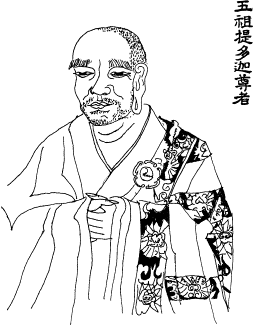
The Bodhi Seal
|
The Bodhi Seal THE FIFTH PATRIARCH, VENERABLE DHIRTAKA |
| Composed
by the Venerable Master Hsuan Hua Translated by Bhiksuni Heng Ch’ih |
|
The Venerable One was from Magadha. When he was born his father dreamed that golden sunlight illumined heaven and earth. It was as if there were a golden sun dazzling heaven and earth. When he grew up he met the fourth patriarch and sought to issue the home-life. He beseeched the fourth patriarch to allow him to leave home. The Patriarch said, the fourth patriarch said to him, is it your body, which leaves home or your mind? Is it your body that wants to leave home or is it your mind that wants to leave home? He answered saying, "My seeking to leave home is not for the sake of my body or mind. It is not my body that leaves home nor is it my mind; it's not because of these that I want to leave the home life." "If not the body or mind, then who leaves home? If you aren't leaving home for the sake of your body or mind then ultimately who is it who is leaving home?" He answered saying, "What leaves home is not the self nor the things belonging to the self. It's just that the mind originally is not produced on extinguished. The lack of production or extinction off the mind is the constant Way. That's the way all Buddhas are, their minds are not produced or extinguished. The mind is without form or appearance. That's the way its substance is." The Patriarch said, "In the future you will have a great awakening. In the future you will become greatly enlightened. Your mind of itself will magically penetrate. When you become enlightened your mind will have a special understanding." And then he shaved his head. He received the complete precepts and was transmitted the great Dharma. After he received the complete precepts he was given the great Dharma. After the Venerable One obtained the Dharma, once it was transmitted to him, he traveled and taught in Central India and transmitted the Dharma to Micchaka, the sixth patriarch. Then he ascended into empty space and performed the eighteen transformations—from the top of his body he emitted the fire and from his lower body he emitted water; from the top of his body he emitted water from his lower body and he emitted fire; he sat, stood, and laid down in emptiness and manifested all kinds of such inconceivable states. He entered the firelight samadhi and burned his own body. He used the fire of samadhi to burn himself up. A praise says: The mind is not produced or extinguished Wishing to hide it, it appears even more. Dharma is not the constant Way It’s like digging sores in healthy flesh; Like speaking of a dream within a dream, Or broadcasting family scandals abroad. The fire-light samadhi: Like adding frost to snow. The mind is not produced or extinguished. If you want to cover it, it grows even more. Dharma doesn't have any constant way, it's like digging a sore in healthy flesh. This means that originally people's self-nature was just like the Buddhas' but if you force it into a mold, it's like digging a sore in good flesh. We people are in a dream and further speak of dreams; we go out talking about the bad things that happen in the family. Entering the firelight samadhi is like adding frost to snow. Another verse in his praise says: Leaving the homes of the world, afflictions, and the three realms Dreams, transformations, bubbles, shadows and flowers in space. Liberating the body and mind one is apart from distinctions. When long and short perfectly fuse even ksanas disappear. Shouldering the responsibility of the Tathagata he transmitted the great work. He spoke with a loud sound to teach those confused and senseless. As the end drew near he disclosed the firelight samadhi. His self-mastery and spiritual penetrations were boundlessly wonderful. When you leave home you leave these three homes: the worldy home, the home of afflictions, and the home of the three realms--the desire realm, the form realm, and the formless realm. People's lives are like dreams, transformations, bubbles, shadows, and like flowers in space. When your body and mind both obtain liberation you don't have any discriminations. There are no long times or short times; there aren't even any ksanas. The fifth patriarch projected the fullness of his patriarchal voice—the mind-sound--to awaken those who were murky and as if drunk. At the end of his life he entered the firelight samadhi and cremated his own body. His independence and spiritual penetrations were wonderful beyond bounds. -------------------- The Ten Grounds Chapter of the Avatamsaka Sutra, which has been appearing in Vajra Bodhi Sea, is not included in this issue. The series will continue next month in issue 92. The Editorial Staff regrets this interruption. |